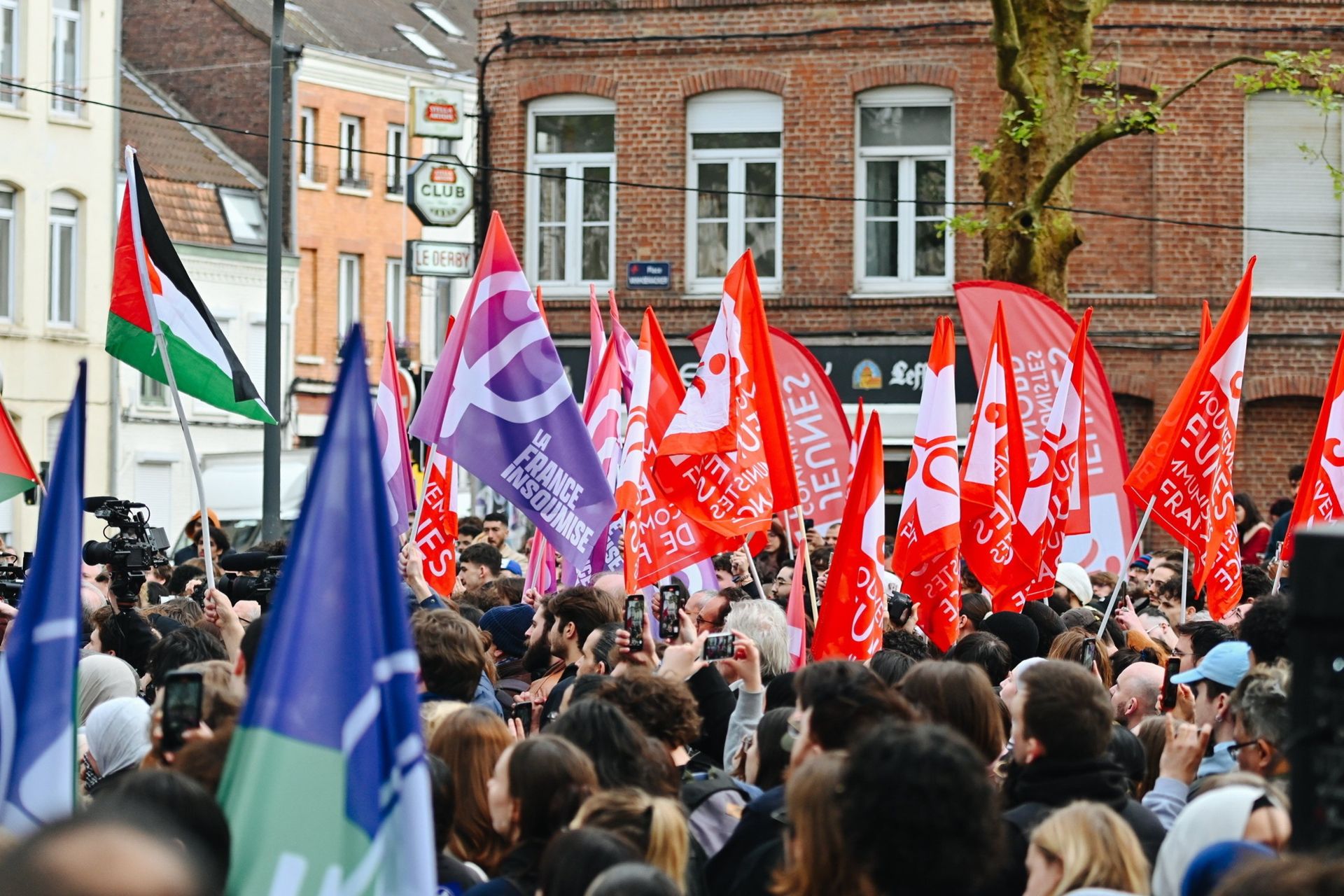Between the European parliament elections on June 9 and the forthcoming French parliamentary elections on June 30 and July 7, France seems to have returned to a traditional pattern: left against right or, more precisely, “progressives” against “fascists”. The liberal centre, President Emmanuel Macron’s electoral base, has apparently collapsed, as has the former Gaullist party Les Républicains.
On the left, although the moderate Parti Socialiste recovered some ground on June 9, the political scene is dominated by the radical and very vocal La France Insoumise (France Unbowed), headed by Jean-Luc Mélenchon, which just trailed them. The Greens, meanwhile, can provide no more than a marginal boost for the left.
The earthquake is the advance of the far right. The Rassemblement National (RN) of Marine Le Pen — formerly the Front National — won 31.5 per cent of the French votes for the European parliament, to which one should add the more radical Reconquête headed by Éric Zemmour, at 5.5 per cent.
What happened? Macron won the presidency in 2017 by uniting the centre-right and centre-left under his new party, En Marche (now called Renaissance), splitting the Socialists and Les Républicains. These two parties never really recovered from the hijacking of their moderate wings.
The rise of Le Pen’s RN in polls and elections gave the impression that French society was drifting to the right, a pattern shared by many European countries. Consequently, instead of remaining firm at the centre, Macron turned to a more rightist policy on social benefits, immigration, Islam and public order; he also extolled patriotism and pledged to fight “wokism” in academia. He remained liberal only on feminist and gender issues, with the right to abortion added to the constitution.
This shift squeezed Les Républicains between the RN and Macron’s party, without bringing new votes from the right for Macron. On paper there is still a centrist electorate, if we add the Parti Socialiste score to that of Renaissance and half of Les Républicains, roughly speaking the pro-European voters: together they made up more than 30 per cent at the European elections. But Macron’s personal and narcissistic management makes it quite impossible to revive such a coalition and his party is now crumbling.
We are heading towards a “cohabitation” between the president and a hostile majority. The only question is whether Le Pen’s RN will have sufficient numbers to impose its candidate as prime minister, or whether chaos will prevail in France’s Assemblée Nationale.
Meanwhile, the left is sounding the bugle against fascism. It replays the 1930s by setting against the extreme right a “Popular Front” that unites the Parti Socialiste, La France Insoumise, the French Communist party and the Greens. This coalition has nevertheless antagonised many centrists who hate Mélenchon because of his support for Palestinians and multiculturalism, and who would have preferred a call for a “Republican Front” that could exclude extremists from both right and left.
But in any case, this paradigm simply does not work any more. Society has changed. The young do not care about history. Moreover, the charge of antisemitism — traditionally a rallying call against the extreme right — is now used against the extreme left. A prominent figure in the fight against antisemitism, Serge Klarsfeld, announced that he would vote for the RN over La France Insoumise. Public intellectuals such as Alain Finkielkraut, who drifted from left to right in the name of the defence of laïcité (secularism) against Islam, said that he would consider voting for Marine Le Pen to keep LFI from power.

Nowadays, many moderate voters are more afraid of Mélenchon than Le Pen. A wave of Mélenchon-bashing is sweeping the media, fuelled by the billionaire Vincent Bolloré, who owns a vast array of journals, magazines and TV channels. And the fiery rhetoric of Mélenchon does not help the leftist coalition, even if it has been joined by former president François Hollande, who is finding a new popularity precisely for what made him unpopular when he was in power: his moderation and nondescript profile.
In 2002, when Jacques Chirac attracted votes from the left to defeat Jean-Marie Le Pen, the idea of a “Republican Front” was used to unite people across political divides solely for the defence of the state and its institutions. But this was a time when the different parties saw themselves as rooted in a common history and had deep ties to local politics, where compromises and personal relationships with opponents are essential.
When Chirac borrowed votes to defeat Jean-Marie Le Pen, the ‘Republican Front’ united people. That is no longer the case
That is no longer the case. Of the six parties that still count, four (Reconquête, RN, Renaissance and La France Insoumise) function along a populist conception of politics (a charismatic leader appealing directly to “the people”, while ruling his or her party through a camarilla of close friends, family members and proxies).
Only Les Républicains and the Parti Socialiste look like traditional political parties. But as far as LR is concerned, this changed on June 11, when party president Éric Ciotti announced an agreement with the RN without consulting anybody. Once confronted by the other members of his party’s governing council, he shut himself in his office and addressed journalists from a window — a ludicrous remake of Mussolini in a Charlie Chaplin movie.
Despite being adversaries, former presidents François Mitterrand and Chirac were both seen as responsible statesmen who protected France’s institutions. Following a trend initiated by Nicolas Sarkozy, the president from 2007 to 2012, Macron tried to bypass them, appointing businessmen to diplomatic or academic positions, and engaging private consulting companies to perform tasks that were previously done by civil servants. This contempt for the “deep state” was accompanied by a contempt for traditional politics. Macron never tried to set up a real political party. Candidates were selected by a small committee around the president, not at local level.
“Populism” is not just a threat from the extreme right. It is a way of doing politics that is increasingly dominant. Egos and quarrels notwithstanding, such a convergence also explains why the arrival of the RN in government might entail not a complete rupture but rather an intensification of trends already evident under Macron.
The strong performance of the RN follows what seems to be a trend in Europe: the electorate’s shift to the right in favour of populist parties. There are clearly two components to this support: a hostility towards migrants in general and Islam in particular, and a rejection of globalisation and Europe in favour of protecting a “way of life”, whatever falls under that label. The connection between the two is more accidental than structural.
The issue of immigration is seen by the media and politicians as crucial to support for the RN — according to an opinion poll last year, 65 per cent of French people think that welcoming additional immigrants is not desirable. But in this case, why did they not vote for Reconquête, the only party to put at the top of its agenda the fight against immigration and a call for “remigration”? At the European elections, Zemmour’s party just passed the 5 per cent threshold that allows it to enter the European parliament. The vote for the RN is more complex than just an anti-immigration reflex.
The gilets jaunes revolt during Macron’s first term embodies the anti-establishment dimension of the current support for the RN: the fight to preserve a certain way of life. The gilets jaunes movement was not racist or especially anti-immigration. Its target was the arrogance of the establishment. It protested against punitive environmentalism, restrictions on car use, the decay of public transport, the growing gap between big cities and life in the distant periphery. Many parts of the RN programme are not far from that of La France Insoumise: a lowering of the pension age, nationalisation of the highways (once more, the freedom to use cars), a hostility to Brussels bureaucracy.

What role has hostility to Islam played in the vote for the extreme right? With many migrants in Europe being Muslims and most Muslims being of migrant origin, the two issues tend to get confused. Nevertheless, in northern and western European countries, the Muslim population is largely well established and with citizenship. Consequently, the debate about Islam goes beyond the debate on immigration: populists claim to fight against the “Islamisation” of their society and to defend a national identity against this Islamisation.
Twenty years ago I explored (in my book Globalised Islam) how the Muslim cultures of migrants changed, and how a new generation of young Muslims attempted to recast Islam in a western cultural context. This does not mean necessarily to construct a more liberal or “enlightened” Islam but to focus on markers of faith. For instance, in traditional Muslim societies, food is supposed to be halal, and few people would bother to check. In a western society, the criteria for halal need to be clearly defined and made explicit, hence visible (with a special label). If a Muslim woman chooses to wear a headscarf, it is an immediate marker of faith and identity and makes Islam visible at the core of French society.
A broad coalition opposing “Islamisation” slowly developed. On the right were opponents of immigration and those nostalgic for a Catholic France; on the left were secularists who saw in Islam a new “obscurantism”. Many feminists (Élisabeth Badinter, for instance) and gay rights activists also perceived Islam as a threat to legal breakthroughs on gender equality and same-sex marriage. The conservative Catholics fighting against LGBTQ rights did not join the fray, but looked at Islam through the eyes of their crusader ancestors. The terrorist attacks of the 2012-16 period helped the two currents coalesce.
France has never been the cradle of political liberalism, but there is an obvious shrinking of the space for freedom
Beyond such a coalition remains a big question. What does it hold up in opposition to Islam? Christianity or liberal values? Notre-Dame or Charlie Hebdo? Viktor Orbán or Geert Wilders?
While all populists in Europe oppose Islam and immigration, they do not agree on how to define the European values they champion. In fact, if they wanted to promote conservative values, they would have little problem with Islam. But most populists seek to defend western liberal values (as do leftist secularists): the best example in Europe is Wilders in the Netherlands. Marine Le Pen pledged not to overturn the law on abortion and same-sex marriage, and is not known for homophobia.
In their personal lives, western Europe’s populist leaders do not exemplify traditional values. Nor are their voters eager to renounce sexual freedom and toleration. Populist parties that put forward a programme of returning to religious norms fail in elections. Poland’s Law and Justice party tried for eight years to implement Christian norms through legislation; it lost in 2023, with the issue of abortion prominent. In Spain the same year, the populist Vox party, which campaigned against abortion, gay marriage and the tightening of anti-femicide laws, saw its vote fall 2.7 per cent in parliamentary elections, while the Partido Popular, its rightwing ally — which had voted for same-sex civil unions — gained 12.3 per cent.
The failure of the Christian right parties and the caution of populists in promoting traditional values have one simple explanation: that voters’ shift to the right does not reflect a desire to return to those values. In all regards, for better or worse, our societies are liberal: sexual freedom, hedonism and individualism are prized. European populists are mostly secularist. There is no fascination with sacrifice, death and glory. The “culture wars” that divide the US are not effective in Europe with few exceptions (Poland’s Law and Justice or Hungary’s Viktor Orbán — at least in his speeches, because Hungarian society is as liberal as the others in terms of social mores).
What distinguishes France in the current European political landscape is the role of laïcité. Initially, this was just a legal and constitutional concept of separation of church and state (the famous law on separation in 1905). But when, following the “scarf affair” in 1989 (three well-integrated schoolgirls decided to enter their secondary school wearing headscarves and were expelled), Islam came to be seen as the main threat to laïcité, which ceased to be just a legal principle and became a kind of national culture. Laïcité was turned from a legal principle into an identity marker.

Marine Le Pen’s 28-year-old protégé Jordan Bardella could be the next prime minister if the Rassemblement National wins enough seats in the two-part National Assembly election
Henrique Campos/Hans Lucas
Jean-Luc Mélenchon, the far-left leader of La France Insoumise, is a dominant figure in the Nouveau Front Populaire
Louai Barakat/Hans LucasSince then the conservative right — which in the past century often tried to restrict the use of laïcité in order to provide more room for Catholic schools — has been confronted with a choice: either to insist on the Christian identity of France or to endorse laïcité as the best tool to contain Islam. With the exception of ultra-conservative Catholics, it overwhelmingly chose to defend laïcité. Today, from Le Pen to the right of the Parti Socialiste, through Les Républicains and Macron, there is a consensus that laïcité should be imposed in order to block Islamisation. This specific consensus should be kept in mind in the case of a cohabitation: Macron and Le Pen do share some common values.
Rather than a fascistic extreme right pitted against a progressive Popular Front, the divide on values suggests there are three distinct constituencies in France. The first is a reactionary, conservative Christian right fighting against both Muslims and progressives, eager to cancel the post-1968 cultural revolution but reduced to almost a cult. The second is an extreme left, multiculturalist, anti-colonial, environmentalist and feminist, well represented in the universities, which promotes freedom of religion for the oppressed but is less open towards Christianity. And third, there is a wide spectrum of secularists who target Islam whatever the historical roots of their hostility towards it, from the RN to the centre-left, and defending the supposed “French way of life”. One certainly could object that this last coalition differs considerably on democracy, freedom of speech, Europe and relations with Russia. But these differences do not play a role as long as the extreme right is not in charge.

In recent years — in brief, from the appointment of Manuel Valls as minister of interior by the Socialist president François Hollande in 2012 to this year — the expression of any kind of dissent, from the gilets jaunes to militant ecologists, and the public expression of Muslim religious practice has met a harsher response from authority. We have seen the violent repression of demonstrators, the rise of killings in encounters between unruly youth and police and, more importantly, the building of what I call a policy of authoritarian pedagogy to impose the values of the Republic.
France has never been the cradle of political liberalism, but there is an obvious shrinking of the space for freedom. With Marine Le Pen at the helm it would certainly become worse, especially at the beginning of her tenure: the police would consider that there are no more restraints on their right to open fire, and some self-appointed vigilantes would make forays into disaffected suburbs or against leftwing hotbeds.
Despite this, an RN-led government would find a space for collaboration with other political forces and with sometimes unexpected personalities by insisting on the defence of laïcité. On economic issues, under pressure from business, the party would have to retreat towards budgetary orthodoxy. At the same time, a flock of opportunists would join. Given the lack of experience and professionalism in the party cadres, it would need these opportunist technocrats, intellectuals, journalists and politicians. Le Pen would limit the violent excesses of her supporters in order not to lose her dearly acquired new respectability. Even so, rivalries and feuds would flare up. Many newly elected local cadres would be engulfed by corruption. An RN-led government would try to control the judiciary, to turn the largely subsidised cultural world into an entertainment enterprise and to “dewokise” universities.
But in seeking to impose an authoritarian laïcité against Islam, the RN would only accentuate a trend already at work under Macron, who has allowed the billionaire Bolloré to create a dominant media space à la Murdoch, and who has begun, with the support of the majority of the members of parliament, an offensive against academic institutions. In short, Macron has already started to weaken France’s institutions. There is no reason why he should not be able to cohabit with Marine Le Pen. She would leave to him the state dinners and official trips. He would let her govern. Probably for the worse . . .
Olivier Roy is a professor at the European University Institute in Florence and author of ‘The Crisis of Culture: Identity Politics and the Empire of Norms’ (Hurst)
Find out about our latest stories first — follow FT Weekend on Instagram and X, and subscribe to our podcast Life & Art wherever you listen